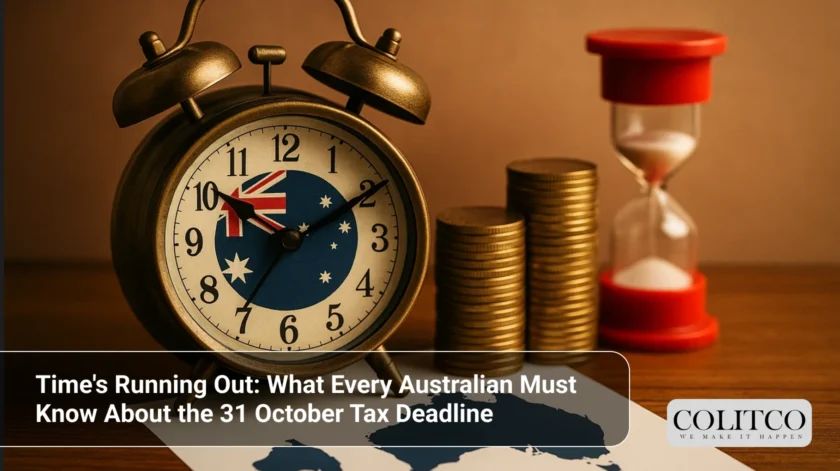The clock is ticking for millions of Australians who haven’t yet filed their 2024-25 tax returns. With 31 October 2025 looming as the final deadline, taxpayers face potential penalties of up to $1,650 if they miss the cut-off date.
The Australian Taxation Office (ATO) has made it clear through its official channels that anyone who earned income between 1 July 2024 and 30 June 2025 must lodge their return by the end of this month. No exceptions for self-lodgers.
The Penalty Price Tag That Could Hit Your Wallet
Missing the ATO tax lodgment due date triggers an automatic penalty system that starts at $330 for the first 28-day period. The fines don’t stop there.
For each subsequent 28-day block, another $330 gets added, with the total capping at $1,650 after five periods. That’s 140 days of accumulating penalties.
But here’s the kicker most people don’t know: you can still be fined even if the ATO owes you a refund. The penalty applies to failing to lodge on time, not for having a tax debt.
 A tax return form that breaks down exactly how your taxes are spent
A tax return form that breaks down exactly how your taxes are spent
Your Extension Options Still Exist
Not everyone needs to panic about the 31 October deadline. Registered tax agents can secure automatic extensions for their clients, potentially pushing deadlines out to May 2026.
There’s a catch, though. You must register with a tax agent before 31 October and maintain a clean lodgment history with no outstanding returns or serious tax debts.
The extension doesn’t happen automatically. Your tax agent needs to have you registered in their lodgment program before the deadline passes.
Who Actually Needs to Lodge
If you earned more than $18,200 during the 2024-25 financial year, lodging a tax return isn’t optional. This threshold applies to:
- Wages and salaries
- Casual work payments
- Government allowances
- Investment income above certain levels
Even if you didn’t reach the tax-free threshold, you may still need to submit a Non-lodgment Advice to inform the ATO.
The Hidden Cost: General Interest Charges
Penalties aren’t the only financial hit. The ATO applies General Interest Charges (GIC) on any unpaid tax liability, compounded daily.
As of October 2025, the GIC rate stands at 10.61% per annum. That means a $1,700 tax bill could quickly balloon with accumulated daily interest charges on top of late lodgment penalties.
The compounding effect makes procrastination expensive.
When and How to Lodge Your Return
The ATO’s lodgment system opened on 1 July 2025, but rushing in immediately isn’t always smart. Tax professionals recommend waiting until mid to late July when the ATO finishes uploading pre-filled information from employers, banks, and other third parties.
This waiting period helps avoid discrepancies that could require amending your return later.
Most Australians can lodge through myTax, accessed via their myGov account. Once lodged, most returns process within two weeks, though the ATO can’t speed up processing even if you call.
What Happens If You’re Already Late
Already past the deadline? The best strategy is to lodge as soon as possible to minimise accumulating penalties.
The ATO shows more leniency to taxpayers who are upfront about their situation. You can request penalty remission if you have extenuating circumstances like serious illness, natural disasters, or other unforeseeable events outside your control.
Documentation supporting your reason for lodging late strengthens your case for penalty reduction.
Business Owners Face Higher Stakes
For small business operators, the risks multiply. A late personal tax return can trigger reviews of other obligations, and if your BAS lodgments are also late, you face additional penalties on each separate lodgment.
Cash-based businesses and gig economy workers operating through platforms like Uber or Airbnb face heightened audit risks when returns are overdue.
Making the Right Move Before Time Runs Out
With just days remaining before 31 October, Australians need to act fast. The combination of penalties, interest charges, and potential compliance reviews makes meeting the deadline crucial.
Whether you lodge yourself through myTax or engage a registered tax agent for an extension, taking action now prevents financial pain later. The ATO’s systems are designed to catch late lodgers, and their collection methods have become increasingly sophisticated.
The Australian economy continues facing broader challenges from international trade policies, making it more important than ever for taxpayers to stay compliant and avoid additional financial burdens.
Don’t let a missed deadline cost you hundreds or thousands of dollars. The choice is simple: lodge now or pay later.
Also Read: From Forgotten Diamonds to Cockpit Recorders: Brisbane Airport’s Record-Breaking Lost Property Sale
Frequently Asked Questions
Q: Can I still get an extension after 31 October?
A: If you’re already registered with a tax agent before the deadline, you automatically qualify for an extension, typically until May 2026. However, you cannot register after 31 October and receive this benefit.
Q: What if I’m owed a refund?
A: You can still face penalties for late lodgment even if the ATO owes you money. The penalty is for missing the deadline, not for having a tax debt. You also won’t receive your refund until you lodge.
Q: How much are late lodgment penalties?
A: Penalties start at $330 for the first 28 days late and increase by $330 for each subsequent 28-day period, up to a maximum of $1,650.
Q: Do I need to lodge if I earned under $18,200?
A: If your income was below the tax-free threshold and you meet certain conditions, you may not need to lodge a return, but you must submit a Non-lodgment Advice to the ATO.
Q: How long does it take to process my return?
A: Most online returns are processed within two weeks, though paper returns can take up to 50 business days. The ATO cannot expedite processing regardless of when you lodge.












